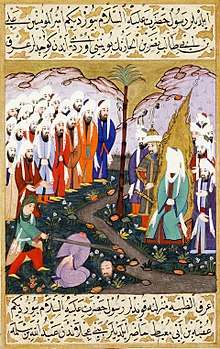Nadr ibn al-Harith
Al- Naḍr ibn al-Ḥārith ibn ʿAlqamah ibn Kaladah ibn ʿAbd Manāf ibn Quṣayy (Arabic: النضر إبن الحارث) (d. 624 CE) was an Arab pagan physician who lived in the same time and region as the Islamic prophet Muhammad. He was captured after the Battle of Badr and then executed. After the battle, Muhammad decided to return to Medina. While Muhammad was returning to Medina, he reportedly received a revelation regarding the distribution of war booty. This per tafsir was the Quran verse Quran 8:41.[1][2]

According to the authentic Books of history of Islam, two captives – Nadr bin Harith and ‘Uqbah ibn Abū Mu‘ayṭ were beheaded by Ali. > The event is claimed to have inspired Nadr's relative Qutayla to compose an elegy on his death, upbraiding Muhammad for the execution.[3]
Life
The son of al-Harith ibn Kalada, a doctor who attended the Persian school in Gundeshapur, Nadr ibn al-Harith was also a doctor and a practitioner in Hejaz.[4] He came from Taif and used to tell the Persian stories of Rustam and Isfandiyar.[5] Per Islamic traditionists like Muqatil ibn Sulayman, Nadr had accused Muhammad of plagiarism in his Quranic verses based on the stories of ancient people. He was captured after the Battle of Badr and then executed. Mohar Ali states that while he did accuse Muhammad of plagiarism, he was executed for other offences though he doesn't specify what it was, although he names al-Nadr as one of the assassins who tried to kill Muhammad before his migration to Medina. David Samuel Margoliouth however claims that he was executed for his challenge and ridiculing Muhammad, a version supported by some ninth and tenth-century Muslim sources including Tabari who cites an oral report of Muhammad justifying his order on basis of Nadr accusing him.[6] Al-Waqidi mentions a report that Nadr asked the Muslims why he was to be executed, they replied that it was for him persecuting and torturing the Muslim as well as ridiculing the Quran.[7][8]
Quran verse about the beheading of al-Nadir ibn Al-Harith
Ibn Kathir also mentions this incident in his book Tafsir ibn Kathir and states the Quran verse Quran 8:31 was revealed about al-Nadir ibn al Harith. Ibn Kathir's commentary on Quran 8:31 and Quran 8:5 is as follows:[9][10]
An-Nadr visited Persia and learned the stories of some Persian kings, such as Rustum and Isphandiyar. When he went back to Makkah, He found that the Prophet was reciting the ayats of Qur'an sent from Allah to the people. Whenever the Prophet would leave an audience in which An-Nadr was sitting, An-Nadr began narrating to them the stories that he learned in Persia, proclaiming afterwards, Who, by Allah, has better tales to narrate, I or Muhammad. When Allah allowed the Muslims to capture An-Nadr in Badr, the Messenger of Allah commanded that his head be cut off before him, and that was done, all thanks are due to Allah. The meaning of,
(. ..tales of the ancients)
[Tafsir Ibn Kathir, on Quran 8:31]
References
- [Quran 8:41]
- Husayn Haykal, Muhammad (2008). The Life of Muhammad. Selangor: Islamic Book Trust. p. 250. ISBN 978-983-9154-17-7.
- Sarah Bowen Savant, The New Muslims of Post-Conquest Iran: Tradition, Memory and Conversion (Cambridge: Cambridge University Press, 2013), p. 176. E.g. Ibn Khallikan's Biographical Dictionary, trans. by Bn Mac Guckin de Slane, Oriental Translation Fund (Series), 57, 4 vols (Paris: Printed for the Oriental translation fund of Great Britain and Ireland, 1842-71), I 372.
- Shahîd, Irfan (1 February 2010). Byzantium and the Arabs in the Sixth Century. Harvard University Press. p. 179. ISBN 978-0-88402-347-0.
- Byzantium and the Arabs in the Sixth Century, Volume 2, Part 2, p.179, Irfan Shahîd. Also see footnote
- Sarah Boven Savant. The New Muslims of Post-Conquest Iran: Tradition, Memory, and Conversion. Cambridge University Press. pp. 174, 175. ISBN 110729231X.
- Rizwi Faizer. The Life of Muhammad: Al-Waqidi's Kitab Al-Maghazi. Routledge. pp. 53, 54. ISBN 1136921141.
- Journal of King Abdulaziz University: Islamic economics, Volume 3. al-Majlis al-'Ilmī bi-Jāmi'at al-Malik 'Abd al-'Azīz. p. 106.
- [Quran 8:31]and [Quran 8:5]
- Muhammad Saed Abdul-Rahman, The Meaning and Explanation of the Glorious Qur'an (Vol 3) 2nd Edition, p. 412, ISBN 1861797699, MSA Publication Limited, 2009. (online)